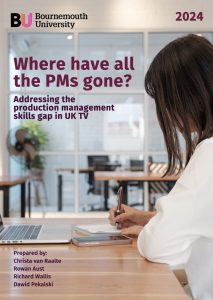 New research into production management in the UK’s TV industry has found that there is a corrosive cultural divide between ‘production’ and ‘editorial’. This distinction between those involved in the ‘creative’ aspects of making tv and those who manage its more logistical aspects is what lies at the heart of much of the discontent experienced by today’s production managers, the research has found.
New research into production management in the UK’s TV industry has found that there is a corrosive cultural divide between ‘production’ and ‘editorial’. This distinction between those involved in the ‘creative’ aspects of making tv and those who manage its more logistical aspects is what lies at the heart of much of the discontent experienced by today’s production managers, the research has found.
‘We have known for a long time that production managers lack visibility and feel undervalued’, explains Dr Christa van Raalte, who led the project. ‘When three-quarters of respondents told us last year that they were seriously considering leaving we knew the problem was deeply rooted. The aim of this latest research has been to gain a much clearer understanding of what it is that attracts people into production management roles in the first place and what we could do better to keep them. What’s the point of investing in the recruitment of new production talent if we can’t hang on to the ones we’ve got?’
The new report launched this week, Where have all the PMs gone? Addressing the production management skills gap in UK TV, builds on an earlier survey with in-depth interviews. The result is a detailed and nuanced account of the experience of working in production management. The report makes eleven recommendations for change, from clearer job definitions and more equitable pay rates, to improved training and development.
The report concludes that there is much to be done to ensure that production management is properly recognised and understood both in and beyond the industry, that PMs are treated equitably and respectfully, and that employers are able to recruit and retain the workforce they need. This cannot be achieved without addressing ingrained working culture and practices. The challenge this represents for the wider industry, claims the report, should not be underestimated.
The project’s research team is based at the University’s Centre for Excellence in Media Practice (CEMP) and funded by the British Academy and Leverhulme Trust.
The full report and a shorter summary are available at https://eprints.bournemouth.ac.uk/39530/
Tagged / television
TV interview in Nepal
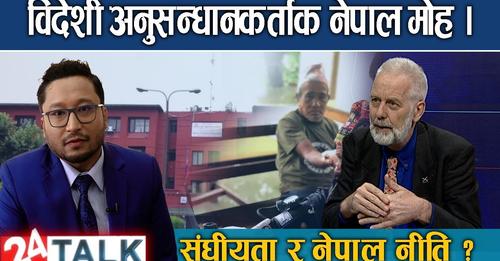 Two days ago Professor Edwin van Teijlingen from BU’s Faculty of Health & Social Sciences was interviewed by the national television channel News24 in Kathmandu, Nepal. His interview covered some more personal questions, including the question how Edwin became involved in research in Nepal two decades ago, followed questions about recent research projects. The latter involved questions about the nearly completed project “The Impact of Federalisation on Nepal’s Health System: A longitudinal Analysis’. This project, launched in 2020 at the beginning of the COVID-19 pandemic, is led by the University of Sheffield, in collaboration with BU, the University of Huddersfield, Canterbury Christ Church University, PHASE Nepal and MMIHS (Manmohan Memorial Institute of Health Sciences). This nearly four-year project is UK-funded by the MRC (Medical Research Council), the Wellcome Trust and DFID (now called the Foreign, Commonwealth & Development Office [FCDO]) under the Health Systems Research Initiative.
Two days ago Professor Edwin van Teijlingen from BU’s Faculty of Health & Social Sciences was interviewed by the national television channel News24 in Kathmandu, Nepal. His interview covered some more personal questions, including the question how Edwin became involved in research in Nepal two decades ago, followed questions about recent research projects. The latter involved questions about the nearly completed project “The Impact of Federalisation on Nepal’s Health System: A longitudinal Analysis’. This project, launched in 2020 at the beginning of the COVID-19 pandemic, is led by the University of Sheffield, in collaboration with BU, the University of Huddersfield, Canterbury Christ Church University, PHASE Nepal and MMIHS (Manmohan Memorial Institute of Health Sciences). This nearly four-year project is UK-funded by the MRC (Medical Research Council), the Wellcome Trust and DFID (now called the Foreign, Commonwealth & Development Office [FCDO]) under the Health Systems Research Initiative.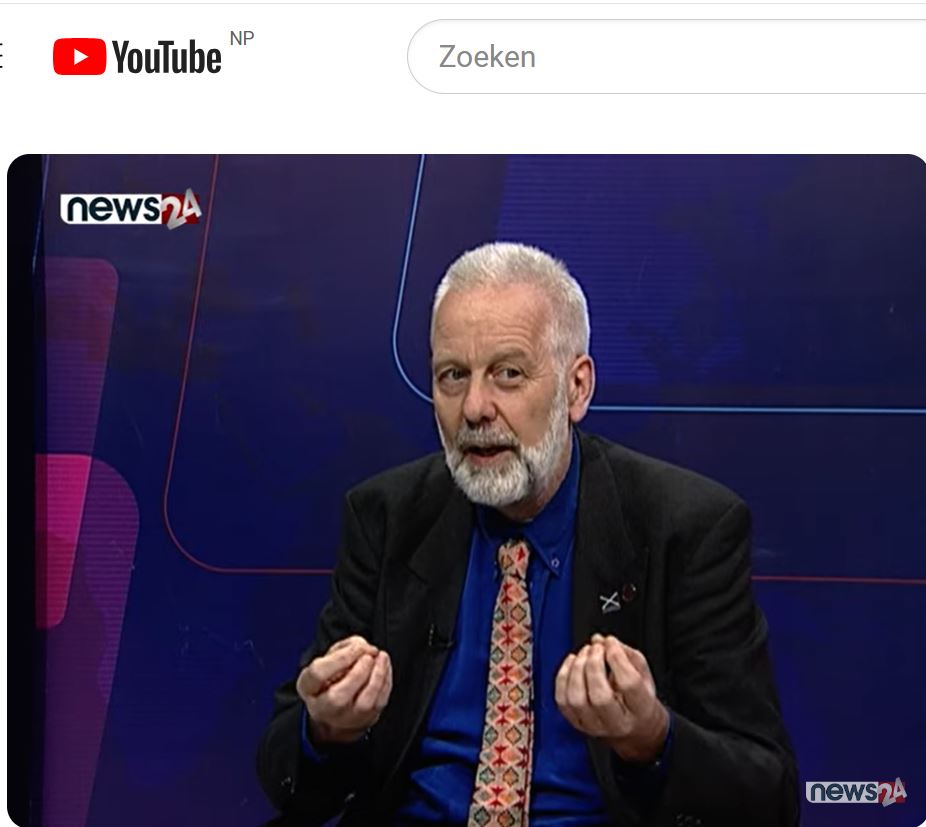
There were also questions about the health and well-being of Nepal’s migrant workers, partly related to a recently finished study on kidney health of migrant workers funded by The Colt Foundation and a new project led by La Isla Network in the United States of America (USA). La Isla Network, Johns Hopkins University Bloomberg School of Public Health (in the USA) , Nepal Development Society and Bournemouth University are leading the first-ever international effort to research and address trafficking among Nepalese labour migrants. The work is funded by a $4 million cooperative agreement awarded by the U.S. Department of State’s Office to Monitor and Combat Trafficking in Persons, International Programs. 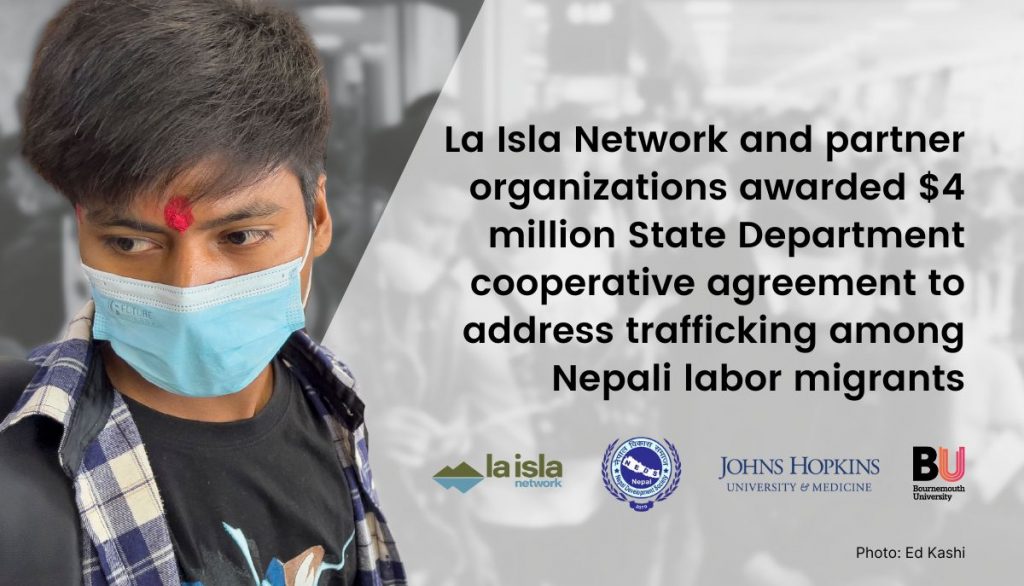
The television company has already put the half-hour interview on YouTube, to watch it click here!
How and why did TV’s retention crisis come to be framed as a recruitment problem?

There’s currently a talent crisis in the television industry. As I’ve previously described in this blog, media careers have a ‘shelf-life’ with more experienced talent tending to move on and up elsewhere. This has long been the case, but what’s new is that since 2015 there has been a massive increase in demand for content. It’s sometimes called ‘the Netflix effect’. Suddenly the shortage of experienced skilled workers has been exposed as never before.
In the research we publish this week, Christa van Raalte and I have examined in depth the way in which a problem of attrition within the television industry came to be framed as a problem of recruitment. We explore how and why this came about, despite the implausibility of the idea that getting more young people to come and work in the film and television industries (however vast their numbers) could compensate for the attrition of experienced workers – an idea that has taken root and informed industry policy. Our aim is to help refocus the discussion on the reasons why people are leaving the industry, and the practical measures that need to be taken to nurture careers beyond entry-level. We also highlight the dangers inherent in policy research where there is a gravitational pull for evidence-based policy to be overridden by policy-based evidence.
Video abstract: Britain’s Got Talent? A Critique of the “Talent Pipeline” Crisis in the UK’s Film and Television Industries.
Midwifery and the Media
Today we received an end-of-year good-news message from ResearchGate telling us that 700 people had ‘read’ our book Midwifery, Childbirth and the Media [1]. 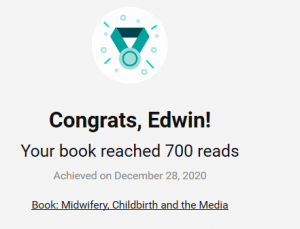 Lee Wright, Senior Lecturer in the School of Nursing and Midwifery at Birmingham City University wrote in his review of our edited volume: “…our media image and digital foot print are rapidly becoming the most important window into our profession. In a rapidly changing environment this book provides an up to date and informative insight into how our profession is affected by the media and how our profession can inform and influence the image of midwifery. This area is going to become even more important in the future universities and trusts increasingly use broadcast and social media to manage information and inform our clients of the services we provide. This book will be the important first text in a new growth area. It brings together an internationally recognised group of authors who are experts in this field. I wholeheartedly recommend it to you.”
Lee Wright, Senior Lecturer in the School of Nursing and Midwifery at Birmingham City University wrote in his review of our edited volume: “…our media image and digital foot print are rapidly becoming the most important window into our profession. In a rapidly changing environment this book provides an up to date and informative insight into how our profession is affected by the media and how our profession can inform and influence the image of midwifery. This area is going to become even more important in the future universities and trusts increasingly use broadcast and social media to manage information and inform our clients of the services we provide. This book will be the important first text in a new growth area. It brings together an internationally recognised group of authors who are experts in this field. I wholeheartedly recommend it to you.”
This edited collection was published by Palgrave Macmillan in 2017 and it is part of a larger body of Bournemouth University research on the topic [2-6].
Professor Edwin van Teijlingen, Professor Vanora Hundley and Associate Professor Ann Luce
References:
- Luce, A., Hundley, V., van Teijlingen, E. (Eds.) (2017) Midwifery, Childbirth and the Media, London: Palgrave Macmillan [ISBN: 978-3-319-63512-5].
- Luce, A., Cash, M., Hundley, V., Cheyne, H., van Teijlingen, E., Angell, C. (2016) “Is it realistic?” the portrayal of pregnancy and childbirth in the media BMC Pregnancy & Childbirth 16: 40 http://bmcpregnancychildbirth.biomedcentral.com/articles/10.1186/s12884-016-0827-x
- Angell, C. (2017) An Everyday Trauma: How the Media Portrays Infant Feeding, In: Luce, A. et al. (Eds.) Midwifery, Childbirth and the Media, London: Palgrave Macmillan pp: 45-59.
- Hundley, V., Luce, A., van Teijlingen, E., Edlund, S. (2019) Changing the narrative around childbirth: whose responsibility is it? Evidence-based Midwifery 17(2): 47-52.
- Hundley, V., Duff, E., Dewberry, J., Luce, A., van Teijlingen, E. (2014) Fear in childbirth: are the media responsible? MIDIRS Midwifery Digest 24(4): 444-447.
- Hundley, V., Luce, A., van Teijlingen, E. (2015) Do midwives need to be more media savvy? MIDIRS Midwifery Digest 25(1):5-10.
BU BMC paper followed up by BMC Series Blog
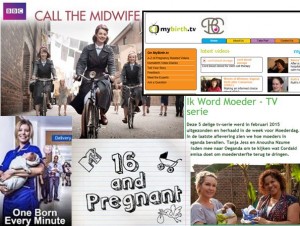 Our latest paper in the international journal BMC Pregnancy & Childbirth published late last month was highlighted yesterday in a BMC Series Blog.[1] The blog post reminds us that the media plays an important role in providing the general public with information about a range of issues, including pregnancy and childbirth. The visual media, such as television, can provide planned information (education), for example in documentaries, advertising and the news. Our paper “Is it realistic?” the portrayal of pregnancy and childbirth in the media’ looked into how the representation of childbirth in the mass media affects childbirth in society as there is evidence to suggest that it can have a negative effect. BMC Pregnancy & Childbirth is an Open Access journal therefore the paper is freely available for anybody across the globe with an internet connection, for access click here.
Our latest paper in the international journal BMC Pregnancy & Childbirth published late last month was highlighted yesterday in a BMC Series Blog.[1] The blog post reminds us that the media plays an important role in providing the general public with information about a range of issues, including pregnancy and childbirth. The visual media, such as television, can provide planned information (education), for example in documentaries, advertising and the news. Our paper “Is it realistic?” the portrayal of pregnancy and childbirth in the media’ looked into how the representation of childbirth in the mass media affects childbirth in society as there is evidence to suggest that it can have a negative effect. BMC Pregnancy & Childbirth is an Open Access journal therefore the paper is freely available for anybody across the globe with an internet connection, for access click here.
 Our paper is great example of interdisciplinary research, as celebrated at the forthcoming Interdisciplinary Research Sector Day on June 21st (see here). The authors of our paper combine expertise in media studies, midwifery, sociology and health services research. Moreover, it involved collaborations across universities (Bournemouth and Stirling) and within BU across faculties, namely the Faculty of Media & Communcation and the Faculty of Health & Social Sciences.
Our paper is great example of interdisciplinary research, as celebrated at the forthcoming Interdisciplinary Research Sector Day on June 21st (see here). The authors of our paper combine expertise in media studies, midwifery, sociology and health services research. Moreover, it involved collaborations across universities (Bournemouth and Stirling) and within BU across faculties, namely the Faculty of Media & Communcation and the Faculty of Health & Social Sciences.
Ann Luce, Marilyn Cash, Vanora Hundley, Helen Cheyne, Edwin van Teijlingen & Catherine Angell
Reference:
- Luce, A., Cash, M., Hundley, V., Cheyne, H., van Teijlingen, E., Angell, C., (2016) “Is it realistic?” the portrayal of pregnancy and childbirth in the media BMC Pregnancy & Childbirth 16: 40 http://bmcpregnancychildbirth.biomedcentral.com/articles/10.1186/s12884-016-0827-x
What would TV look like without the BBC? Get involved!
The British Academy will be one of the partners of a major inquiry into the future of public service television, chaired by Lord Puttnam.![]()
The Inquiry, www.futureoftv.org.uk, which is based at the Media and Communications department, Goldsmiths, University of London, is set up to consider the nature, purpose and role of public service television today and into the future. It aims to address ways in which public service content can be most effectively nurtured taking into consideration a growing range of services, platforms and funding models. More details can be found here.
There is an exciting opportunity to attend a free event where you can join a panel of policymakers and practitioners as they take on this hotly debated topic to consider how this British institution should be funded. Details are as follows:
Tuesday 15 December 2015, 6-7.30pm
The British Academy, 10-11 Carlton House Terrace, London, SW1Y 5AH
Chaired by Lord (David) Puttnam, former Deputy Chairman of Channel 4 (2006-12)
Confirmed speakers:
Greg Dyke, former Director-General of the BBC (2000-4)
Claire Enders, founder, Enders Analysis
Brian Eno, musician and producer; delivered the BBC Music John Peel Lecture 2015
More details and how to register can be found here. ![]()











 Dr. Ashraf cited on ‘Modest Fashion’ in The Guardian
Dr. Ashraf cited on ‘Modest Fashion’ in The Guardian NIHR-funded research launches website
NIHR-funded research launches website Academics write for newspaper in Nepal
Academics write for newspaper in Nepal New paper published on disability in women & girls
New paper published on disability in women & girls Global Consortium for Public Health Research 2025
Global Consortium for Public Health Research 2025 MSCA Postdoctoral Fellowships 2025 Call
MSCA Postdoctoral Fellowships 2025 Call ERC Advanced Grant 2025 Webinar
ERC Advanced Grant 2025 Webinar Horizon Europe Work Programme 2025 Published
Horizon Europe Work Programme 2025 Published Horizon Europe 2025 Work Programme pre-Published
Horizon Europe 2025 Work Programme pre-Published Update on UKRO services
Update on UKRO services European research project exploring use of ‘virtual twins’ to better manage metabolic associated fatty liver disease
European research project exploring use of ‘virtual twins’ to better manage metabolic associated fatty liver disease